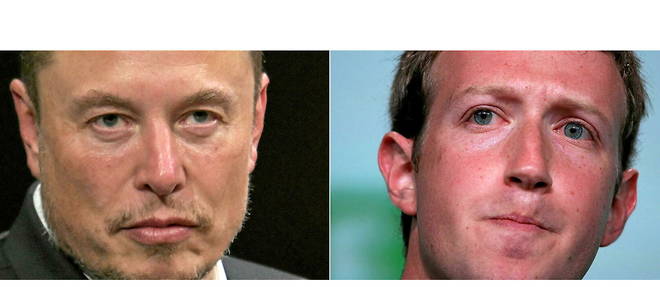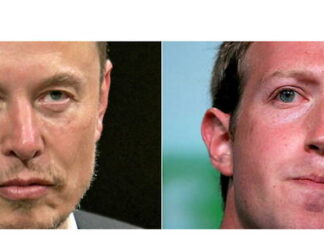How far will Elon Musk’s provocations of Mark Zuckerberg go? Responding to an online joke, the serial entrepreneur (Tesla, SpaceX, Starlink…), who has also owned Twitter for a little over a year, had already accepted the idea of a bare-knuckle fight “in a cage” with the Facebook co-creator.
However, faced with the success of the Threads social network, launched in recent days by Instagram, one of the centerpieces of Meta, the company run by the same Mark Zuckerberg, Elon Musk seems to be beside himself. After threatening to sue Threads for allegedly copying Twitter, the world’s richest man is now calling his main competitor a “cuckold,” declaring himself ready for a dick measuring contest. sex…
I propose a literal dick measuring contest ��
“Intelligence, especially if it is very high, can perfectly go hand in hand with forms of sociopathy, or at least with a surprising personality whose reactions are sometimes unexpected”, relativizes Olivier Babeau, professor at the University of Bordeaux and founding president of the Institut Sapiens think tank. Essayist, he is notably the author of The New Animal Farm (Les Belles Lettres editions, 2016), Political Horror (Les Belles Lettres, 2017), The New Digital Disorder. How digital is exploding inequalities (Buchet-Chastel, 2020) and The Tyranny of Entertainment (Buchet-Chastel, 2023).
For him, if we owe social networks the fact of having allowed billions of people to interact with communities that go far beyond the circle of their family or friendly relations, the current spectacle is a mise en abyme of these tools. “The bosses of social networks, networks often accused of contributing to the hysterization of public debate, come to exchange playground remarks. A new perverse effect of these platforms already accused of locking their users in bubbles, as well as, in some cases, of encouraging depression?
The Point: How to explain that a personality who prides himself on thinking about the future of humanity is reduced, to shut the beak of his most dangerous competitor, to encouraging a contest about the size of their sexes?
One can also mobilize an explanation by the hubris of people whose wealth is counted in hundreds of billions of dollars and who necessarily live in a sphere of interactions, understanding, interests which is not that of ordinary mortals. . When you have it all, what interests you is particular: to delay death as long as possible, to leave a mark in history and to experience thrills. Wealth also buys the freedom to break free from certain codes without consequence.
Isn’t this, on the contrary, an illustration of the extreme fragility of its economic model? Clearly, is this entrepreneur who became a tycoon with the takeover of Twitter just a paper giant?
This is indeed another explanation: Musk’s very surprising “competition” proposal would mainly reflect a form of nervousness, if not outright concern. Twitter has lost advertisers. The dazzling progress of Threads – 100 million users in five days – and its backing to the hyperpowerful lever of WhatsApp and Instagram, when Twitter is only a pure player of social networks, indicate that it may be in the process of to happen in the very closed world of social networks that matter.
The disturbing characteristic of our time, especially because of technologies, is that everything is going faster. Ascents and falls. In the past, market shares were quite stable, new technologies changing the rules of the game being rare. From now on, any ultradominant winning product can be called into question, or even sent to oblivion by an innovation. This is the whole crisis of search engines – and therefore of Google, which derives most of its income from them – in the face of the arrival of generative AI, which is likely to be the new paradigm.
From then on, the cards of competitive positions are completely reshuffled: Google had to accelerate the release of Bard to compete with ChatGPT; Meta had to urgently reorient its forces on the AI by abandoning – probably momentarily – the metaverse. Consumers are also more versatile, with no spirit of loyalty, and the ability to migrate to other platforms in seconds makes the most impressive market shares very fragile. Mise en abyme of these disputes: the bosses of social networks, networks often accused of contributing to the hysterization of public debate, come to exchange remarks – in any case Musk – of the playground.
Is a social network necessarily a polarizing machine or a haven for political correctness, which is what Threads might be heading towards?
That’s the big fight between Twitter and Threads: each is built on very different principles. The first values freedom, the second conviviality – at the risk of less liberal moderation, even very strict, as is the case on Facebook. It is also interesting to note that Threads aims for a different positioning from Twitter: it wants to be the network of less controversial exchanges – we would talk about music, films, series, etc.
He wants to leave politics and intellectual debates on Twitter. Two very different experiences. Beyond that, it’s even political: you could say that Threads poses as a kind of Democratic alternative to a network perceived to be dominated by Republican influence. So it’s both an ego, commercial, philosophical and political war!
Has Elon Musk lost his bet to create free speech heaven?
The games are not done. Twitter still has a long lead and hasn’t lost its users. From a monetization perspective, Musk has done some commercially smart things. The next few months are going to be very interesting. The positioning giving more free rein to the passions of Twitter could even be an asset against other social networks that are pacified but basically sanitized.
This is not what some of the people who frequent them are looking for. This is the now well-known dilemma between the choice of freedom, at the cost of inevitable drifts, and the choice of control of exchanges which wishes to guarantee a less painful online experience for contemporary sensibilities which, let’s face it, are more easily hit than before.


















